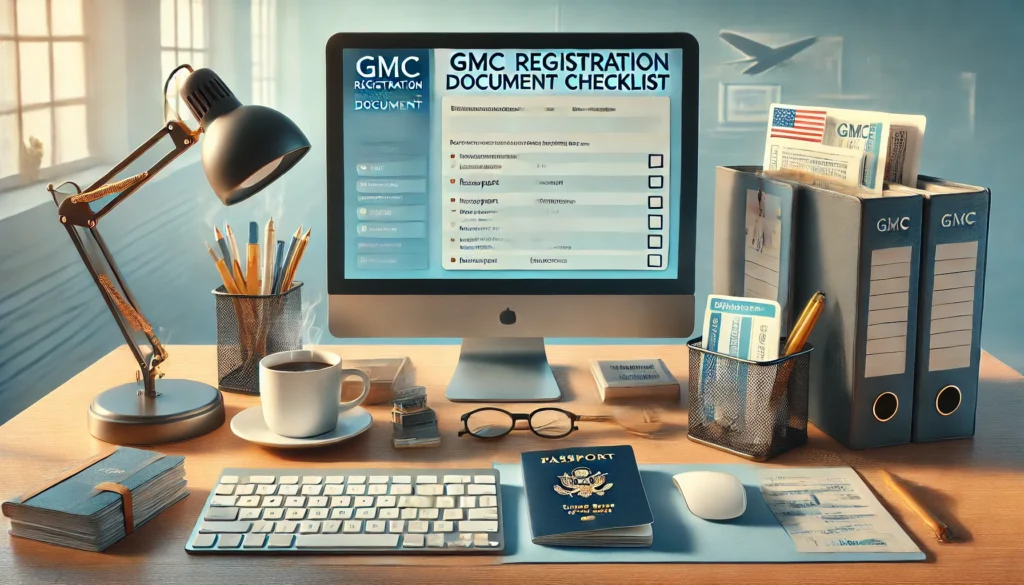Hey there, future doctor! So, you’re gearing up to apply for GMC registration, congratulations on getting this far! Whether you’re just starting to think about it or you’ve already passed PLAB 2 (woohoo!), now’s the time to get your ducks in a row. Trust me, preparing your documents early will save you from last-minute stress and keep your journey smooth.
Let’s dive into everything you need to know about the documents required for your GMC registration application. Think of this as your personal checklist to success!
When Do You Actually Need Original Documents in the UK?
Here’s the good news: thanks to EPIC verification , you might not need to bring your original documents to the UK at all if you’re taking the PLAB/UKMLA route. The GMC no longer requires an in-person ID check appointment, which has made the process faster and easier.
That said, some doctors have reported that the GMC occasionally asks them to mail their original documents later. If you want to play it safe, bringing your originals with you isn’t a bad idea. Better safe than sorry, right?
What Documents Do You Need for GMC Registration?
Alright, let’s break it down and go step by step. These are the essentials you’ll need to gather:
1. Your Passport(s)
This one’s pretty straightforward. Make sure your passport is valid and ready to go. It’s your primary form of ID, so double-check that all the details match what you’ve submitted elsewhere.
2. Your Primary Medical Qualification (PMQ)
Your PMQ, like your MBBS or equivalent degree certificate, must be verified through EPIC before you can proceed. This is non-negotiable. If you haven’t started the EPIC verification process yet, don’t wait! Get on it ASAP because it can take time.
Pro Tip: Keep a scanned copy of your PMQ handy for your GMC application. You’ll also need to provide your EPIC ID during the online application process.
3. Proof of English Language Proficiency
You’ll need to show that you meet the GMC’s English language requirements. This means submitting your IELTS or OET Test Report Form. Make sure your scores meet the GMC’s minimum standards (e.g., an overall score of 7.5 in IELTS with no band below 7.0).
4. Internship Documents
The GMC needs proof that you’ve completed an internship or house job. Here’s what they’re looking for:
- Internship Completion Certificate: This should confirm that you worked in approved posts, mention the specialties you trained in, and state whether the posts were full-time or part-time.
- Letter of Approval for Internship: Some doctors may need this letter to clarify that their internship was monitored by an authority. If your completion certificate already mentions provisional registration, you might not need this, but it’s better to check with the GMC first.
Remember, your internship must meet the GMC’s criteria, so ensure your documents clearly outline your training and responsibilities.
5. Certificate of Good Standing (CGS)
This is a big one. The CGS confirms that you’re in good standing with your medical regulatory authority and haven’t faced any disciplinary actions. Here’s what you need to know:
- You’ll need a CGS from every country where you’ve been registered or licensed to practice medicine in the past five years, even if you didn’t work there.
- The certificate must confirm that you’re entitled to practice medicine, haven’t been suspended or disqualified, and have no ongoing issues.
- CGS validity is only three months from the date it’s issued. Timing is crucial here!
If you’re no longer registered with a regulatory authority, you can request a Certificate of Past Good Standing instead.
Pro Tip: If your medical council can send the CGS directly to the GMC, take advantage of that option, it’ll save you time and hassle. Otherwise, arrange for someone back home to apply for it while you’re in the UK. This ensures the document stays valid when you submit your application.
6. Employer References (GEN 1 Form)
You’ll need to complete a GEN 1 Employer Reference Form for:
- Any periods of non-medical work in the last five years.
- Any periods of medical work where you weren’t registered.
Don’t skip this step! Being honest about your employment history is critical. Failing to disclose something could lead to serious consequences, including being banned from applying to the GMC.
If you’re unsure whether a particular job counts as medical or non-medical, ask yourself: Did you have direct patient contact? If not, it’s likely non-medical (e.g., teaching anatomy or working in a lab).
7. Evidence of Fitness to Practice
The GMC wants to ensure you’re fit to practice medicine safely. Alongside your CGS, they’ll review your entire application to assess this. Be prepared to explain any gaps in your clinical practice or significant breaks in your career.
For more guidance on addressing clinical gaps, check out resources like Breaks in Clinical Practice .
Do You Need Anything Else?
These are the basics, but remember, everyone’s situation is unique. After you submit your online application, the GMC will email you a personalized list of additional documents they need. This might include:
- Letters from your medical council (if you weren’t fully registered).
- Consultant reports (GEN 2 Form) to verify your internship if there’s any doubt about its acceptability.
Be proactive and responsive. If you’re unsure about anything, reach out to the GMC, they’re there to help!
Timing Is Everything
Let’s talk timing because it’s super important. Here’s why:
- CGS Validity: Remember, your CGS is only valid for three months. If you apply too early, it might expire before your GMC application is processed.
- Processing Delays: Depending on your country’s medical council, it can take days or even weeks to issue your CGS and other documents. Factor in travel, exams, and waiting for results, it adds up quickly!
To avoid headaches, consider having someone apply for your documents while you’re in the UK. This way, the signed date is delayed, ensuring the documents remain valid when you need them.
Frequently Asked Questions
1. Do I Need Employment Certificates from Every Job?
Nope! Your Certificate of Good Standing (CGS) covers all your medical work in a specific country. You don’t need separate certificates from each employer.
2. What If I’m Not Fully Registered with Any Medical Council?
Don’t panic! Just inform the GMC about your situation. They’ll ask for an official letter from your medical council confirming that you held provisional registration but aren’t fully registered.
3. What If I Never Held Provisional Registration During My Internship?
Double-check with your hospital’s administration office. Many interns are required to hold some form of registration to practice, even if it wasn’t explicitly called “provisional.” If you’re certain you didn’t, the GMC may ask your supervising consultants to complete a GEN 2 Consultant Report Form to verify your training.
4. Does the GMC Accept Any Letter of Recommendation (LOR)?
Nope. The GMC provides its own forms (like GEN 1 and GEN 2) for references and reports. Stick to their templates to avoid delays.
5. What If My Employer Doesn’t Have an Official Email?
Try using your institution’s official email address. If that’s not possible, contact the GMC to explore alternatives like fax or post.
Final Thoughts
Gathering these documents might feel overwhelming, but take it one step at a time. Start early, stay organized, and don’t hesitate to reach out to the GMC if you’re unsure about anything.
Remember, honesty is always the best policy. Be transparent in your application, and keep communication open. The GMC isn’t out to make life difficult, they just want to ensure patient safety and maintain high standards.
You’ve got this! With the right preparation, you’ll be well on your way to achieving your dream of practicing medicine in the UK.
Good luck, and feel free to drop your questions in the comments, I’m here to help!










